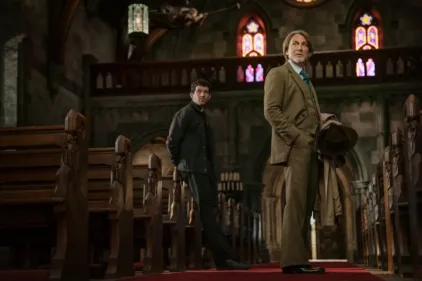Oliver Stone’s “Natural Born Killers” uses the talents of three of Hollywood’s most notorious rebels: Writer Quentin Tarantino (“Reservoir Dogs“), and actors Woody Harrelson (“White Men Can’t Jump“) and Juliette Lewis (“Kalifornia“). I asked him to talk about all three.
Stone on Tarantino: “When Quentin wrote those two characters, Mickey and Mallory, they were originally based on, I guess, Bonnie and Clyde. But he basically wrote a different movie than the one I’ve made. He wrote a very nice, clever take-off on an AIP picture with a ’90’s wryness. It was mostly about the TV journalist, and Mickey and Mallory were just sort of crazy, stick figures.
“It was a clever script but he didn’t want to do it so he moved on to do ‘Reservoir Dogs.’ I think he was hurt that I rewrote it so much. But I told him that I really can’t make what he, as a 26-year-old, would make as a first film. As a 47-year-old filmmaker, it doesn’t interest me. I want another level of socio-political comment and I want to deal with the whole justice system. I want to deal with the killers; where they come from, who their parents are.
“Quentin hasn’t seen the movie, so who knows what he’ll say? His approach to violence is a little different; at least it used to be. He always seems to be making movies about other movies. I don’t think that his violence has been realistic. It’s more, ‘Can I do the violence in the most new and shocking and unconventional way?'”
Stone on Juliette Lewis: “Juliet’s a special resource who’s coming into her own. I had problems with the last few films she’s done. She seemed to be sleepwalking through her roles and I was a little concerned at the beginning. I almost let her go because she was not working in such a way as to tell me she was serious. She was only 19 and she’d never been to a technique class; she didn’t have those skills.
“Gary Oldman, who’d worked with her, told me, on the other hand, that she was great when the camera turned on, so I went a long way to stick in there with her. And finally we got her into the kind of shape we felt was necessary. She’d say ‘I can act this,’ when a scene involved physical timing. Well, you can’t ‘act’ physical stuff; for that scene, you had to practice with a boxer. But she was great whenever the camera rolled. Sometimes I wonder about her technique and her approach but she surprised me constantly. I’d work with her tomorrow. I think she’s a major young actress. She’s tiny but she’s powerful and feral and very comfortable inside that role, playing it.”
Stone on Woody Harrelson: “I liked him very much in ‘White Men Can’t Jump.’ I thought he was terrific and underappreciated in a tough role there. And he’s got that ability to play a character with a kind of midwestern dopiness and low IQ, but with very clever eyes, demonic eyes. He’s charming (ital) and (unital)demonic, I guess. Audiences kind of like him. It’s nice to see that crazy grin. And he looks great clean-shaven. You know his dad is in jail. Leavenworth. You know about his dad?”
I heard something.
“Yeah. Woody comes from a tougher place than the guy they see on ‘Cheers.’ I think he’s probably a very violent person. That’s why he does yoga so much.”











